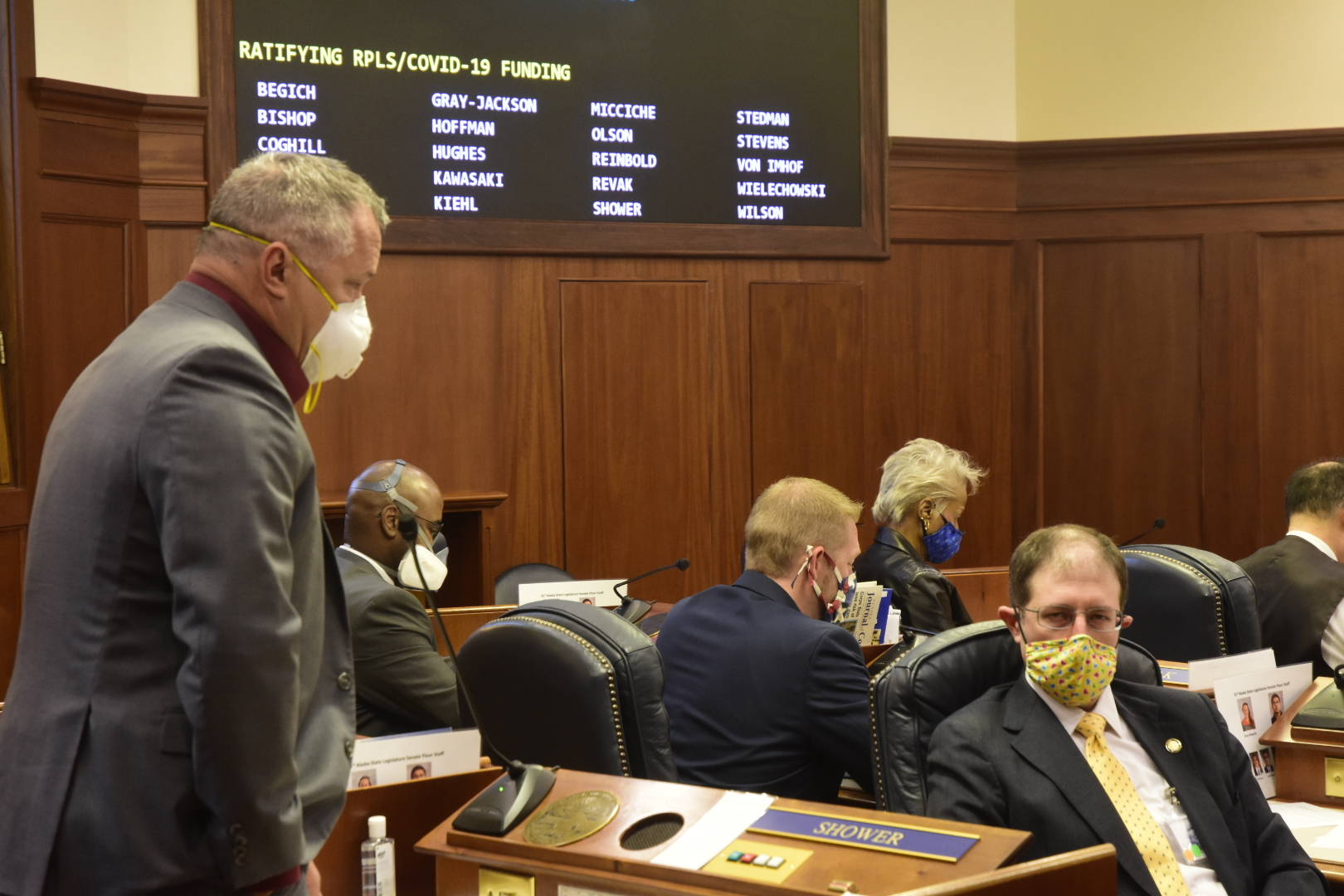Senators are waiting until Wednesday morning to approve a final version of Gov. Mike Dunleavy’s appropriations of federal COVID-19 relief money because of constitutional rules.
Both chambers of the Alaska State Legislature passed identical bills Tuesday morning, ratifying the governor’s proposals for distributing federal coronavirus relief funds. The Legislative Budget and Audit Committee had approved the governor’s distributions last Wednesday, but a lawsuit questioning the legality of that action brought lawmakers back to Juneau on Monday.
Senate Finance Committee co-chair Bert Stedman, R-Sitka, introduced the Senate bill saying the money was meant to help Alaskans during a time of “unprecedented economic pain.”
[Lawmakers dive back into work]
“A record number of Alaskans are out of work,” Stedman said. “The longer we wait, the fewer will have jobs to return to. These funds need to go out immediately, preferably yesterday.”
While both bodies held near-unanimous votes to pass their bills, the House acted faster, leaving the remainder of the work to the Senate. Shortly after voting on House Bill 313, House members voted to adjourn “sine die,” or indefinitely, and by noon Tuesday several representatives had left the Capitol.
However, senators had to remain, taking up the House bill in the Rules Committee in a meeting that took less than 15 minutes. Most of the legislative work was done by noon, but the state constitution doesn’t allow for bills to be introduced, referred to committee and passed by both bodies in the same day.
Earlier Tuesday morning, senators voted 19-1 to ratify the governor’s proposals, with only Eagle River Republican Lora Reinbold voting against. After a short discussion on the floor Tuesday morning, Reinbold told her fellow senators she felt deep empathy for the people of Alaska who were suffering under what she called “unconstitutional mandates.”
But, she said, simply ratifying the governor’s revised program legislative requests, or RPLs, would be handing the Legislature’s appropriation power over to the executive office.
Sens. Bill Wielechowski, D-Anchorage, and Mike Shower, R-Wasilla, said they shared Reinbold’s concerns about giving up legislative power, but considering the circumstances, they weren’t going to hold up money any longer.
“I wish this wasn’t the only option presented to us,” Shower said. “But time is the enemy.”
The House also voted for ratification 38-1, with only Rep. David Eastman, R-Wasilla, voting against the bill. Following the votes, lawmakers said they’re confident the ratification bills would satisfy the issues raised by the lawsuit.
“The legal guidance that we saw said this suffices,” said Rep. Sara Hannan, D-Juneau. “For today, I’m not worried.”
Senate President Cathy Giessel, R-Anchorage, said Tuesday afternoon she expected Wednesday’s floor session scheduled for 8:30 a.m. to be brief, but added with a laugh she was wary of making predictions.
Constitution and crisis
Eric Forrer of Juneau on May 14 submitted a lawsuit against the Department of Revenue Commissioner Lucinda Mahoney for allegedly violating the state constitution by allowing the governor to make an appropriation through the RPL process. Not long after Forrer submitted his lawsuit Thursday, lawmakers were instructed to return to Juneau by Monday.
The RPL process allows the governor to add money to certain programs while the Legislature is not in session. Dunleavy tried to avoid bringing lawmakers back to Juneau by proposing distributing over $1 billion in federal relief money using the process.
However, RPLs can only add money to programs which already have the legal ability to get federal funds, making RPLs appropriate for some programs, such as school-related programs which already receive federal money annually, but inappropriate for state programs like small business loans or revenue sharing.
• Contact reporter Peter Segall at psegall@juneauempire.com. Follow him on Twitter at @SegallJnoEmpire.

